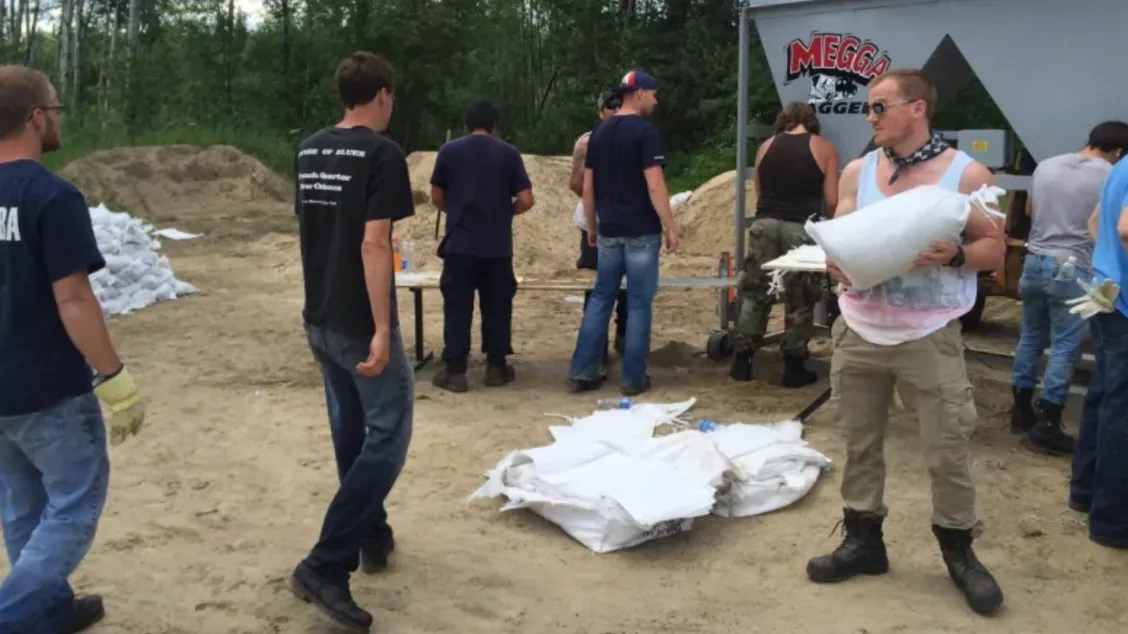
COVID-19 and flooding: How Manitoba is preparing amid pandemic
Organizing a row of volunteers tossing sandbags into place to hold flood waters back may be more complicated this spring, with social distancing measures in place.
Manitoba could soon face some flood conditions, especially in the Red River Valley, where the U.S. National Weather Service's latest predictions call for "moderate to major flooding … in the main stem Red River."
Whatever water comes from the south will arrive in Manitoba as the province, like the rest of the country, is buttoned-up to halt the spread of COVID-19.
The province of Manitoba is expected to release its own flood forecast in the next few days. Its last report in February said precipitation had been below normal in Manitoba, but normal to above normal in most parts of the U.S.
Go HERE for our complete coverage of the COVID-19 pandemic
If the melt remains slow and steady and southern Manitoba doesn't get significant rain or snow, the risk of flooding is low. A big storm with lots of moisture could mean a high risk of major flooding from the U.S. border to Red River Floodway, possibly similar to 2009 — the third-worst Manitoba flood in 100 years — or the 2011 flood, which shut down Highway 75 for a month.
Last year, Manitoba experienced a relatively mild flood season.
Regardless of weather, there are some communities that will get at least some spring flood conditions.
"I guess we are expecting some water at this point in time — it's really hard to tell," said Debbie Fiebelkorn, the mayor of the rural municipality of St. Clements.
Sandbagging properties while keeping to provincial health guidelines that restrict large gatherings may involve protective masks and clothes, or suspending the rules for a brief period.
"If you are sandbagging, you may not be able to do this social distancing," Fiebelkorn said.
"But we do have to try and ensure that we can do the best we can for our residents and ourselves."
A similar reaction comes from Reeve Paul Gilmore in the RM of Montcalm. Flood fighting means close quarters.
"You know, I think it's impossible. How can you do it? And you have to protect properties and people on two fronts. Pretty difficult," Gilmore said.
Gilmore says they did have flooding in parts of the municipality last year, and had to move approximately 12 families out of their homes.

The province says it will announce protocols soon for flood fighting during the COVID-19 crisis. (Holly Caruk/CBC)
The possibility of needing to evacuate communities during a pandemic is an added layer of concern.
"With the virus, it gets complicated. Those people will be mobile and in hotels, and restaurants are closed. It could be quite an issue."
Even Manitoba Premier Brian Pallister isn't sure how to form a sandbag line in a pandemic.
"I've asked those exact questions and we're anticipating some response," Pallister earlier this week.
"I've done lots of sandbagging in my life and it's just … impossible to do sandbagging and physical distancing at the same time."
During a conference call Thursday to announce an extra $5 million in the province's flood protection program, Infrastructure Minister Ron Schuler promised a protocol was coming for evacuees, sandbagging and other flood fighting.
"We will be putting protocols in place how to appropriately sandbag, and do so in a proper environment, considering the kind of environment in which we're in right now with COVID-19," Schuler said.
There are indications this year's flood season may not be too severe, as long as the weather co-operates.
Most local officials and politicians along the Red River keep a close eye on the weather, knowing it may take a turn for the worse quickly.
"I always say Mother Nature always has a way of throwing a wrench into things for us," Fiebelkorn said.
"So if we get really warm temperatures and rain, it could have a huge effect on us."
This article, written by Sean Kavanagh, was originally published for CBC News.









